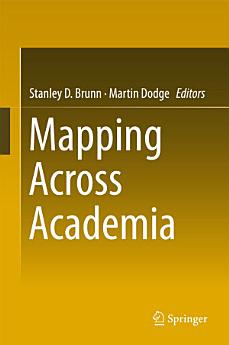Mapping Across Academia
Stanley D. Brunn · Martin Dodge
ກ.ພ. 2017 · Springer
ປຶ້ມອີບຸກ
394
ໜ້າ
reportບໍ່ໄດ້ຢັ້ງຢືນການຈັດອັນດັບ ແລະ ຄຳຕິຊົມ ສຶກສາເພີ່ມເຕີມ
ກ່ຽວກັບປຶ້ມ e-book ນີ້
This book addresses the role and importance of space in the respective fields of the social sciences and the humanities. It discusses how map representations and mapping processes can inform ongoing intellectual debates or open new avenues for scholarly inquiry within and across disciplines, including a wide array of significant developments in spatial processes, including the Internet, global positioning system (GPS), affordable digital photography and mobile technologies. Last but not least it reviews and assesses recent research challenges across disciplines that enhance our understanding of spatial processes and mapping at scales ranging from the molecular to the galactic.
ກ່ຽວກັບຜູ້ຂຽນ
Stanley D. Brunn is a Professor Emeritus of Geography at the University of Kentucky. He has taught at the University of Florida, Michigan State University and seventeen other countries around the world. His research interests primarily include the intersecting areas of the social, political and environmental, cyberspace and communications geography, innovative mapping and disciplinary history. He has traveled to nearly 90 countries, written more than 100 articles and chapters and authored or edited more than twenty books on a wide-ranging set of human geography topics. His current projects include writing a weekly poem. Martin Dodge is a Senior Lecturer of Human Geography at the University of Manchester. He completed his PhD at University College London and has previously worked at Cardiff University and the University of Nottingham. His intellectual interests focus on the social and spatial employment of digital technologies as well as research on urban historical geography, the politics of maps and visualization, and developing an understanding of infrastructures.
ໃຫ້ຄະແນນ e-book ນີ້
ບອກພວກເຮົາວ່າທ່ານຄິດແນວໃດ.
ອ່ານຂໍ້ມູນຂ່າວສານ
ສະມາດໂຟນ ແລະ ແທັບເລັດ
ຕິດຕັ້ງ ແອັບ Google Play Books ສຳລັບ Android ແລະ iPad/iPhone. ມັນຊິ້ງຂໍ້ມູນໂດຍອັດຕະໂນມັດກັບບັນຊີຂອງທ່ານ ແລະ ອະນຸຍາດໃຫ້ທ່ານອ່ານທາງອອນລາຍ ຫຼື ແບບອອບລາຍໄດ້ ບໍ່ວ່າທ່ານຈະຢູ່ໃສ.
ແລັບທັອບ ແລະ ຄອມພິວເຕີ
ທ່ານສາມາດຟັງປຶ້ມສຽງທີ່ຊື້ໃນ Google Play ໂດຍໃຊ້ໂປຣແກຣມທ່ອງເວັບຂອງຄອມພິວເຕີຂອງທ່ານໄດ້.
eReaders ແລະອຸປະກອນອື່ນໆ
ເພື່ອອ່ານໃນອຸປະກອນ e-ink ເຊັ່ນ: Kobo eReader, ທ່ານຈຳເປັນຕ້ອງດາວໂຫຼດໄຟລ໌ ແລະ ໂອນຍ້າຍມັນໄປໃສ່ອຸປະກອນຂອງທ່ານກ່ອນ. ປະຕິບັດຕາມຄຳແນະນຳລະອຽດຂອງ ສູນຊ່ວຍເຫຼືອ ເພື່ອໂອນຍ້າຍໄຟລ໌ໄໃສ່ eReader ທີ່ຮອງຮັບ.








